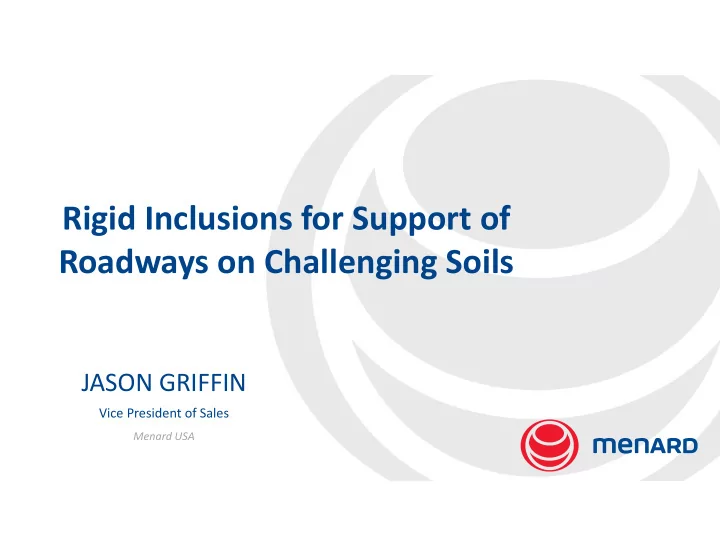

Rigid Inclusions for Support of Roadways on Challenging Soils JASON GRIFFIN Vice President of Sales Menard USA
Rigid Inclusions Structures Treatable Soil Types • Embankments, MSE walls, Abutments • Soft clays & silts • Industrial, residential, commercial & • Controlled & uncontrolled fills retail buildings (including landfills) • Large distribution warehouses • Peat & other organic soils • Oil storage tanks • Loose sand & gravel • Wind turbines • Brownfield/contaminated sites • Utilities and pipelines
Rigid Inclusions - Quality Control TYPICAL QUALITY CONTROL MEASURES • On-Board monitoring • Single-element load testing • Material testing (Grout, LTP) • Pile Integrity Testing (PIT) • On-site engineers
Quality Control • Onboard rig computer system that continuously monitors installation • Real-time data: • Downward Pressure (crowd) • Rotary Pressure & Torque • Rate of Penetration & Extraction • Grout Pressure • Theoretical Profiles of Grouted RI’s • Installation logs are easily accessible and reviewed daily • Submitted to client frequently
Rigid Inclusion vs. Piles
Rigid Inclusions vs. Piles for Embankment/Wall Support Piles & Pile Caps Rigid Inclusions
Rigid Inclusions – Support for MSE walls and Embankments
Rigid Inclusion : System Design Four (4) main components must be designed in together to optimize the overall system: Load transfer platform Rigid Inclusions Soil matrix Structure / slab Optimized designs by adapting spacing and diameters to account for varying: Soil conditions Loads Cut/Fill history
Uniform Load ( Building / Embankment ) Load Transfer by Arching Load Transfer by Arching LOAD TRANSFER PLATFORM 5 - 30% of load on soil Limited settlement Load Transfer Load Transfer by skin friction by skin friction Controlled CONTROLLED Modulus MODULUS 70 to 95% of load in RI 70 to 95% of load in RI COLUMNS Columns
Rigid Inclusion : Load Sharing Principles Q P (0) Q P (0) q S q S Q P (z) Load @ top of Rigid Inclusion NEGATIVE SKIN hc F N FRICTION N N POSITIVE SKIN F P FRICTION Q P (L) Q P (L) z z Load-bearing layer
Settlement Assumptions u p u s Equal settlement planes bulging Equal Settlement Planes / Strain compatibility Equal Settlement Planes / Strain compatibility Equal plane strain Equal plane strain Lateral expansion of column Lateral expansion of column Load transfer through arching Load transfer through arching Load transfer is function of area replacement ratio Load transfer is function of area replacement ratio Load transfer through negative skin friction Load transfer through negative skin friction GRANULAR INCLUSIONS GRANULAR INCLUSIONS RIGID INCLUSIONS RIGID INCLUSIONS
Estimating Settlement with Rigid Inclusions Calculation of settlements for rigid inclusions is not as straight-forward as Equal upper granular inclusions settlement plane Modulus is several orders of Negative shear stress magnitude different domain No strain compatibility Equal intermediate Complex soil-structure interaction settlement plane Positive shear stress Equal lower domain Not Piles! settlement plane Sharing of the load with the soil
Design and FEM Modeling STANDARD DESIGN APPROACHES Plaxis finite element software 2D axisymmetric models 2D plane strain models Global 3D models Slope/global stability software L-PILE In-house design spreadsheets
2D Finite Element Method Analysis using Plaxis 2D Load sensitivity Models symmetric 1-D compression Assumes lateral confinement at symmetric boundaries Valid for inclusions under uniform loading (embankments, slabs, large storage tanks) Good for: confirmatory analyses straight-forward design cases refinement of spacing evaluating sensitivity Limitations: edge effects and non- Rigid uniform loading conditions can’t be Inclusion considered Options Layer sensitivity
3D Finite Element Method Analysis using Plaxis 3D Advantages : Able to evaluate lateral deformation Uniform or variable loads Captures edge effects and 3-D effects Direct output of forces, stresses and moments in the rigid inclusions Disadvantages : Computation time can be significant More effort to build and validate model
RIGID INCLUSIONS – Bearing capacity Existing soil has a bearing capacity based on its in-situ shear strength Additional bearing capacity derived from the RI’s, which results in overall system capacity Shallow bearing capacity is not counted – only the deeper bearing capacity from skin friction Based on diameter and spacing of RI’s
Embankment Stability – Granular Inclusions The block of equivalent improved soil is shown in light blue
Embankment Stability – Rigid Inclusions The block of equivalent improved soil is shown in light blue The rigid inclusion provide three effects : 1. “ Unloading ” of the soils between the inclusions 2. Increased shear resistance along the failure plane 3. Vertical force across the failure plane similar to soil nailing
Rigid Inclusions – Lateral Displacement Lateral Displacement Evaluations • Bester ES (Test Program) • South Capital St. Bridge (Utility/Stormwater) • 4 th & 7 th Brooklyn (for MTA Tunnel) • Grand Ave, ILDOT (XYZ Survey for Duct bank movement) Instrumented Static Load Test of CMC, - Suleiman, 2013 • MNDOT (TPI – in prog) SUMMARY OF EXPERIENCE: • Effects of displacement are localized – can often maintain adequate clearance to avoid negative impact • Methods for eliminating/reducing risk • Partial or Full replacement augering • Preauger locations
RIGID INCLUSIONS – BID UNITS AND COSTS Mobilization – Lump Sum Per Each Testing (Modulus/PIT/Strength) – Per Each Multiple Diameters Varying Embedment Layers Installation Variables include Depth, Load, Diameter, Drilling Conditions, Project size, Working conditions (winter, tight work area, material supply) $/SY - $75 to $750 SY (~$200/SY is common) Consider LOADING or DEPTH variation Use different pay items for each zone $/LF - $15-$60 Consider DIAMETER or DRILLING conditions Lump Sum Need to define add/deduct rates for change in base scope of work
RIGID INCLUSIONS – CHALLENGES IN THE HIGHWAY MARKET Geotechnical # of Borings Testing/Soils Data Responsibility of Selecting soil data (Owner vs. Specialty sub) Design Tender period – Often too short Coordination w/ GCs, Wall Suppliers, Earthwork Specifications Design Build Performance Spec is preferred, w/ clear requirements for Settlement (MSE vs Embankment vs Abutment Zones) and TIME!!! FS - Bearing Capacity/Stability Verification testing – frequency and when performed Obstructions
QUESTIONS?
Recommend
More recommend